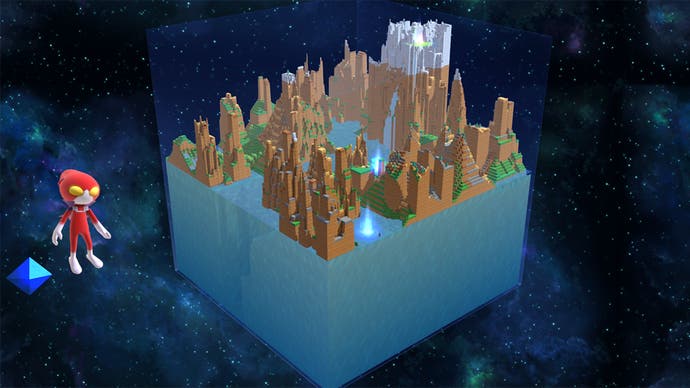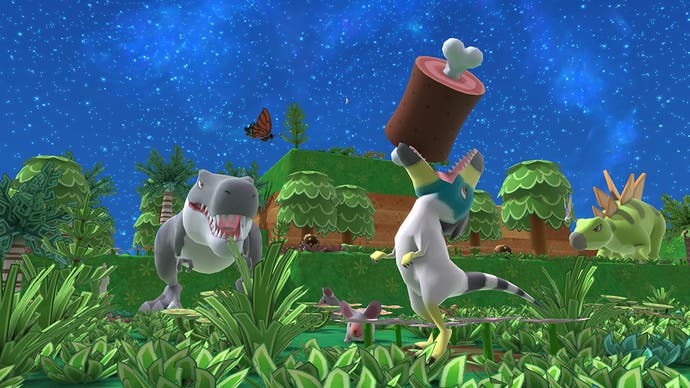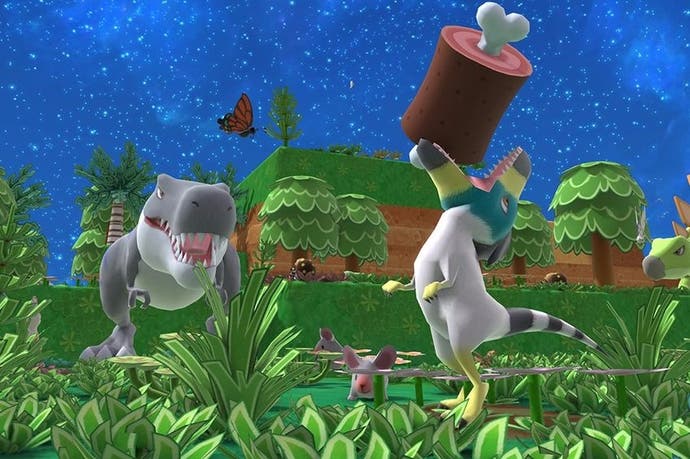Birthdays the Beginning sees Harvest Moon's creator aiming for greener pastures
Let's do the time warp again.
In 2013 scientists discovered an all new mammal: the olinguito. Looking like a cross between a raccoon, ferret and sloth, the newly identified creature is an incredible novelty. Birthdays the Beginning, the upcoming god game from Harvest Moon creator Yasuhiro Wada, seeks to capture the olinguito's discreet charm by offering a dynamic diorama capable of birthing an entire ecosystem of flora and fauna. It aims to be something completely new.
Looking like a minimalist cross between Viva Piñata, Harvest Moon and a Lego set, Birthdays is sure to prove divisive in its zen garden nature, but it strikes at something universal: the thrill of creation and discovery.
On the surface, Birthday's gameplay mechanics are almost comically simple: you raise and lower the landscape of the strange cube-shaped world you've found yourself lording over after following your grandfather's map to its X-marked portal. By changing the terrain's elevation - creating mountains, cliffsides, and lakes in the process - you'll alter your world's temperature. Simply crafting the landscape is your only direct interaction in Birthday.
What keeps it engaging is the effects your inner architect have on the world's evolution. Players will switch from a hands-on Creation Mode to Macro Mode, an overview of your cubic world where you can fast forward time and watch life evolve, grow, die off, and attract more organisms.
Create a couple of humble ponds and skip forward some 48,000 years and you'll see plankton evolve. Skip forward another 40,000 years, and the bio-chemical accretionary structures known as Stromatolite appear. This only takes a few minutes in real-time.
Early missions give players a single objective, like creating life on land, but each mission offers side-objectives as well, like capturing a rare creature or creating additional lifeforms within your condensed world.
Your long-term goal is to create every creature possible, then add them to your library. According to Wada, blazing through the campaign's main goals will leave players only cataloguing about half of the game's lifeforms. As such, you'll have to get creative to discover some of the more obscure organisms. Thankfully, there's a nifty diagram outlining the food chain, offering some direction as you see what your ever-evolving planet is capable of.
There's also an exploratory nature to Birthday, as certain creatures and items that make terraforming the landscape easier are hidden within pockets of the world's cubic geometry. Sometimes even finding creatures produces an engaging Where's Waldo-like challenge with some of the smaller critters well hidden.
Tinkering with your planet's geometry offers a light resource management mechanic as your character has a certain amount of HP dictating how much they can alter in a single turn. Use too many items or make too many moves and your avatar will tire of exhaustion.

This won't end in a game over, however. Wada says the only actual lose condition in Birthdays is to age the planet 999 billion years, an action that would require holding down the fast-forward button for a solid 10 hours in real-time. Running out of HP simply requires you to head into Macro Mode where you steadily regain energy while watching your ecosystem evolve.
It's a mild punishment then. So mild, in fact, that I immediately question its very existence. Why have an HP meter at all if replenishing it is so simple and indefinitely available?
Wada explains the trivial penalty as a way to encourage players to toggle between the turn-based Creation Mode and the non-interactive Macro Mode wherein time passes. "We added the HP aspect to help facilitate going back and forth between the two modes," Wada tells me. "It helps the pacing of the game and it forces the player to be more multifunctional rather than be one-dimensional."
Birthdays, like Harvest Moon before it, looks rather laid-back in nature and not what you'd typically associates with a console title. Wada thinks there's untapped potential there as the current market doesn't house many alternatives. "As a person who grew up with console games, it's kind of sad seeing how everything has dwindled down for the console market," Wada tells me. "But I feel like I wanted to share, or maybe expand that market again by creating a game that's new and different from that tight spectrum of what console games offer right now."

When asked what Wada believes is the most distinguished characteristic between Birthdays and other titles of its ilk, he cites the game's minimalist forms of interaction. "I think the biggest difference between other god games and Birthdays the Beginning is that it's very simple," he tells me. "Other god games you have many different commands that you can do in the game in order to create the world that you want. The basic controls of this game is raising or lowering the land, with the help of items. But it's very simple."
That doesn't mean it's boring, however, as the world's evolution and your tinkering with it keeps everything in flux, even if your meddling with the terrain is turn-based. "You're always actively moving, changing the landscape around," Wada says. "In that way I guess there's an action aspect to it."
Birthdays the Beginning seems more relaxing than exciting, and that's kind of the point. It looks ponderous, meditative, and humbly playful. Maybe it's not the most menacing beast, but it's an all new lifeform all the same, and we don't see many of those anymore.






.png?width=291&height=164&fit=crop&quality=80&format=jpg&auto=webp)



